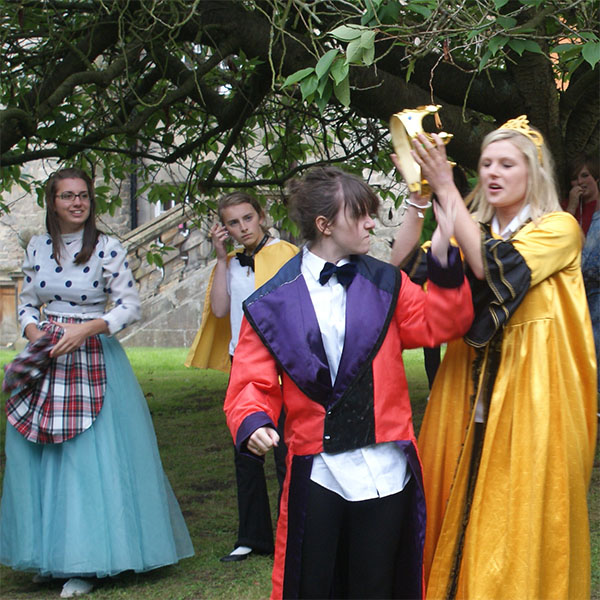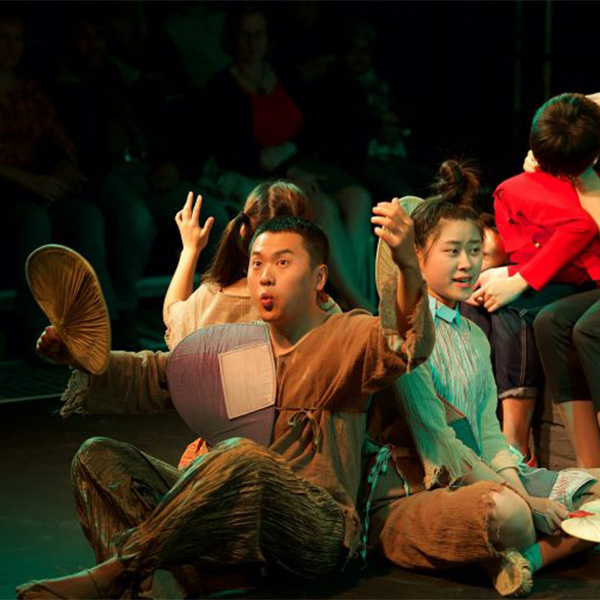Political Drama by Jessica Winston, Professor of English, Idaho State University
Near the beginning of Lucy Nordberg’s play, King Arthur announces a plan to change the government from a monarchy to democracy. He explains:
I can ensure
My choice of heir is just, but every King
Is inconsistent with the last, and so
Not all are guaranteed benevolent.
My country needs a safeguard. I propose
To give each citizen a voice, and let
Their influence be felt in government.
The proclamation sets the plot in motion: the play represents various factions as they intrigue to grab power for themselves. In many ways this play looks to the past: it is set in a legendary Arthurian court, and, as in Arthur’s proclamation, it is written in verse form popularized in the English Renaissance, blank verse—that is, unrhymed lines of iambic pentameter. Yet with Arthur’s declaration, the plot also looks to the present, inviting the audience to reflect on politics in our own time: how can politicians secure their legacy? To what extent is it possible, or advisable, to involve the masses in government? Indeed, in its combination of legendary subject matter, blank verse, and contemporary political resonance, King Arthur resonates with, revives, and makes new a dramatic tradition of blank verse political drama that dates back to mid-sixteenth-century England.
In the mid- to late-sixteenth century, groups of writers affiliated with the London-based law schools and legal societies, the Inns of Court, composed and performed a series of innovative blank verse dramas that invited audiences to reflect on the politics of their own time. The most significant of these is Thomas Sackville and Thomas Norton’s Gorboduc (1562), the first blank verse tragedy in English. The play presents ancient British history, telling the story of King Gorboduc, who announces that he will forgo a patrilineal monarchy and instead divide the realm between his sons, Ferrex and Porrex. The decision sparks a disastrous civil war in which both sons, the king, and the queen die violently, leaving the realm open to foreign invasion. Sackville and Norton composed Gorboduc in the winter of 1561–2, and the play was first performed for members of their own inn of court, the Inner Temple, and then at court for the relatively new queen, Elizabeth I (r. 1558-1603). Scholars have widely recognized the contemporary political relevance of the play, seeing in the foreign invader, the Scottish Fergus, Duke of Albany, a possible allusion to the threat of Mary Queen of Scots to the English throne, and in the debated succession, an allusion to contemporary concerns surrounding the succession and the potential marriage of Elizabeth. As the play closes, several high ranking counsellors argue that decisions involving succession should not rest solely with the monarch, but should be deliberated in parliament. The character Eubulus, whose name means “wise counsellor” states:
Parliament should have been holden,
And certain heirs appointed to the crown,
To stay the title of established right
And in the people plant obedience
While yet the prince did live whose name and power
By lawful summons and authority
Might make a parliament to be of force
And might have set the state in quiet stay.
In these moments, the play thus employed blank verse and historical distance to invite audiences to reflect on current political topics and debates.
Gorboduc initiated a vogue for blank verse political tragedy at the Inns of Court. In 1566, George Gascoigne and Francis Kinwelmersh, both members of Gray’s Inn, composed Jocasta. Based on the myth of Oedipus, the play details the civil war between Oedipus’ sons, Eteocles and Polyneices, following the discovery of Oedipus’s crimes. In the later 1560s, a group of men from the Inner Temple composed the Tancred and Gismond. Based on a story by Boccaccio, this tragedy follows the efforts of the King, Tancred, to prevent his daughter, Gismond, from marrying her beloved, a Count named Guishard. These events lead to Tancred’s murder of Guishard, and to Gismond and Tancred’s suicides. Scholars have recognized that both tragedies, written in the blank verse style of Gorboduc, would likewise have been understood in light of ongoing contemporary concerns about Queen Elizabeth I’s potential marriage alliances and the establishment of a succession.
Nordberg’s King Arthur revives this tradition, a revival that is especially evident in light of one final sixteenth-century blank verse tragedy that takes up Arthurian legend: The Misfortunes of Arthur. Composed by several writers from Gray’s Inn in the later 1580s, the play was performed Elizabeth I at her palace at Greenwich. In Misfortunes, Arthur has been absent from the realm to fight battles for foreign lands, and his son, Mordred, takes advantage of this absence to make a power grab at home, events that lead, like Gorboduc, to civil war and to the death of Arthur and Mordred. Like Gorboduc and the other Inns of Court plays, Misfortunes also invited its audience to reflect on contemporary politics, although, unlike Gorboduc, the authors asked the audience to see the contrasts rather than echoes between stage and life. The prologue to the play explicitly praises Elizabeth I, stating that “Since your sacred majesty / In gracious hands the regal sceptre held, / All tragedies are fled from state to stage.” This comment been understood as a reference to the execution of Mary, Queen of Scots, just over a year before, an event that finally eliminated her and the Catholic threat she represented to the English throne.
One might wonder why this tradition of blank verse political drama developed at the Inns of Court in the Renaissance. The answer is complicated, but one partial answer is this: From the midsixteenth and through the mid-seventeenth century, young, ambitious men, usually sons of the nobility and landed gentry, came to the Inns of Court in the hopes of gaining useful legal education and an urban sophistication that would allow them to thrive at court and elite social circles. It makes sense that these men, looking to law and state service in their future, might have seen in political drama an opportunity to exercise and demonstrate their linguistic skills while establishing their interest in contemporary political affairs. Drama provided a way to express such interest in public and meaningful ways, since they could perform for the queen and other high ranking officials, but not speak with them directly. At the same time, the fictional remove of drama provided a politically safe way to communicate this concern, since the stories resonated with contemporary politics, but were not direct commentaries.
In its topic, form, and contemporary significance, Lucy Nordberg’s King Arthur recuperates and repurposes this early Renaissance tradition of political drama for our own time.

